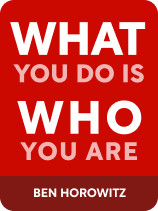

This article is an excerpt from the Shortform book guide to "What You Do Is Who You Are" by Ben Horowitz. Shortform has the world's best summaries and analyses of books you should be reading.
Like this article? Sign up for a free trial here .
What does organizational culture mean? It is something the employees say or something they do?
The title of the book, What You Do Is Who You Are, stresses that actions define a culture. Author Ben Horowitz explains how leaders shape organizational culture, and he offers insights into what culture is not.
Keep reading to understand Horowitz’s definition of organizational culture.
A Look at Organizational Culture
Horowitz doesn’t give a conclusive definition of culture, but he makes clear what culture is not. Culture is not the perks some companies offer to employees, the corporate values that most companies claim to follow, the mission statement, or even the CEO’s leadership style. These can all reflect an organization’s culture, but on their own, they’re not the culture. (Shortform note: Experts agree with Horowitz that perks and other features are surface-level. Most experts say it’s culture’s deeper structure of beliefs and assumptions that define it. However, Horowitz believes values by themselves are surface-level, too—they must be linked to action.)
What does organizational culture mean? From the array of definitions Horowitz gives, we can understand it as the way employees make decisions and act based on their perception of underlying premises and shared beliefs. Actions truly define a culture. Further, because your actions, decisions, premises, and beliefs are unique to your organization, there is no perfect or ideal culture replicable by everyone.
(Shortform note: In Leading Change, John Kotter argues that culture is made up of behaviors, norms, priorities, and values that persist in a group over generations. Although Horowitz doesn’t explicitly say so, we might infer from his emphasis on the culture being sustainable that he agrees that the elements that make up culture are the ones that endure over time.)
Horowitz says culture derives from what leaders state explicitly and also what they enforce implicitly by example and through the organization’s incentive structure. Leaders’ actions and messaging inform employees’ behavior. Therefore, he argues that as a leader, you should be intentional about the culture you’re designing. If you’re not intentional in shaping your culture, your employees will shape it in ways you might not like. What You Do Is Who You Are is about how to translate your beliefs into action—that is, how to create the culture you want and sustain it over time.
(Shortform note: Leaders struggle with designing their culture intentionally, and they often delegate culture to the Human Resources department since HR works closely with all employees, training them and receiving their direct feedback. However, when leaders leave culture in the hands of HR, they’re forgetting that it’s their example that sets the culture most clearly. If a strong cultural identity flows down from the top, it’s easier to get the entire company aligned. If not, siloed departments each start creating their own competing cultures, and there is no coherent identity binding the organization together.)

———End of Preview———
Like what you just read? Read the rest of the world's best book summary and analysis of Ben Horowitz's "What You Do Is Who You Are" at Shortform .
Here's what you'll find in our full What You Do Is Who You Are summary :
- The three reasons leaders should care about culture
- How a sense of purpose boosts employees' performance
- What the Samurai and Genghis Khan can teach you about leadership






